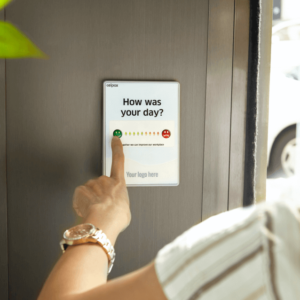In our previous article, “Why feedback culture is important and how to cultivate it in business”, we explored the importance of feedback culture in the modern workplace. So how does this look in practice?
Giving and receiving feedback at work is not always straightforward, and doing so effectively does not come naturally to many, even experienced executives.
However, with the right approach and some practice, this is a skill that you can develop in order to be a better manager or team member, deliver better results, and be more attractive to prospective employers.

Giving and receiving feedback at work
Let’s take a closer look at how you can give feedback in a constructive way, as well as receive it in a way that allows you to make the most out of the process.
How to give feedback
Giving feedback is not only about what you say, but also how and when you say it.
It is important to make sure the context is right: before giving feedback, ask for permission from the other person. This will make sure it’s a good time so they are receptive to receiving feedback. Giving feedback when someone is stressed out or focused on something else pretty much guarantees that the feedback will not be well received.
Some other concrete things you can do to ensure you give feedback in an effective and constructive way include:
- Start with your observation of the situation and its consequences, using “I” statements such as “I feel like…” or “This makes me feel that…”. Remember this is your perception, not universal truth.
- Always be specific. Rather than simply giving general feedback, demonstrate your point with a concrete example. For instance, you could say something like “When I was facilitating the team meeting yesterday, you were typing on your computer a lot, which made me feel like I wasn’t being listened to.”
- Be open to finding solutions together – this should be about coming up with a way to resolve the situation that works for everyone. Being open also means entertaining new solutions that you may not have thought of.
- Ask open questions, such as “How did you experience the situation?” It’s important to remember you might have missed something. After all, yours is not the only perspective.
- Don’t forget that feedback is not just about being critical. Remember to give positive feedback too — if someone does something well, positive reinforcement will encourage them to continue improving.
How to receive feedback
Just as giving feedback requires a level of sensitivity, receiving feedback can also be challenging. Gracefully accepting feedback takes a level of emotional maturity. Furthermore, accepting feedback means genuinely taking it on board and acting on the comments you receive, even the negative ones.
Here are some practices you can develop to better receive feedback and make the most of the feedback you receive:
- Wait for the person to finish giving their feedback before reacting. It is not unusual to feel defensive when getting negative feedback. If you feel yourself going into defensive mode, ask for time to reflect on what you’ve heard before responding.
- Be active when receiving feedback. Ask questions to better understand their concerns or opinions, and try to connect with the other person to find solutions together.
- Own your mistakes. If you realise through the feedback you receive that you’ve done something wrong, it is important to openly acknowledge this and apologise.
- You don’t need to wait for your manager, colleagues or subordinates to come to you with feedback. Instead, you should seek it out in order to support your professional development and hold yourself accountable. Ask for feedback often, especially from people you trust. This will also allow you to practice receiving feedback effectively, identifying your blind spots, and addressing them.
How EDHEC helps you to give and receive feedback effectively
The best online executive education not only provides you with a qualification and technical knowledge, but it also allows you to develop critical soft skills. Interpersonal skills like the ability to effectively give and receive feedback are highly prized in modern workplaces.
EDHEC’s online management training programmes have a strong emphasis on coaching and mentoring. Working with a professional coach throughout the executive programme helps you to explore feedback and prepares you to give and receive feedback in the most productive way possible.
Additionally, EDHEC’s human-focused approach, combined with our diverse and small cohorts, create a great environment to practice your new interpersonal skills.
Developing your skills in this area, including giving and receiving feedback at work, will give you vital skills that you can bring to your current role or to progress your career in new directions.
Take a look at our online course catalogue to learn more.

